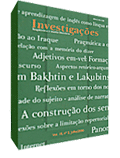Por que as pessoas têm dificuldade em escrever? — reflexões sobre a limitação repertorial e cognitiva da sociedade contemporânea
Abstract
Este artigo sustenta que o meio-ambiente exerece forte influência sobre a prática de linguagem. Posto que a maior parte das cidades do Brasil não oferece um meio-ambiente adequado para o desenvolvimento da escrita e da leitura, parece ser lógico considerar que boa parte das crianças não vão à escola com maturidade lingüística suficiente para alcançar esse “novo” meio de expressão; o que pode ser considerado como uma pista para responder a uma velha e complexa questão: por que os alunos universitários têm problemas para escrever?
References
ALVARES, Pedro de Souza & PIMENTEL-SOUZA, Fernando. A Poluição
sonora em Belo Horizonte. http://www.icb.ufmg.br/lpf/2-2.html#1
AZEVEDO, Adriana Tenuta. 2005. Domínios Discursivos: uma visão cognitive da estruturação de narratives orais Tese de doutorado, Belo Horizonte: UFMG.
BARON, Naomi. 2004. Rethinking written culture Language Sciences, v. 26, p.57-96.
BENFICA, Maria. 2002. Do Texto-Fonte palestra ao relato noticioso: uma
experiência com a retextualização no ensino fundamental. Scripta, v. 6, n. 11, p.171-184.
HARRIS, Roy. 2000. Rethinking writing. London: Athlone.
JOHNSON, Mark. 1997. Developmental Cognitive Neuroscience — an
introduction. Cambridge/Oxford: Blackwell.
MARCUSCHI, Luiz Antônio. 2000. Da Fala para a Escrita — atividades de
retextualização. São Paulo: Cortez.
McWHORTER, John. 2003. Doing our own thing — the degradation of language and music. New York: Gotham Books.
PARISSE, Christophe. 2005. New perspectives on language development and the innateness of grammatical knowledge. Language Sciences, 27: 383-401.
PERINI-SANTOS, Pedro. Por que Chomsky está errado? Scripta. [no prelo]
RODRIGUES, Aurora. 1995. Domínio lexical de meninos e meninas de classe alta e baixa em situação de teste In: ESTUDOS LINGÜÍSTICOS – ANAIS DE SEMINÁRIOS DO GEL XXIV, São Paulo: IEL, p. 562-566.
SPERBER, Dan & ORIGGI, Gloria. 2000. Evolution, communication and the proper function of language; In: CARRUTHERS, Peter & CHAMBERLAIN, Andrew (orgs.) Evolution and the human mind – modularity, language and meta-cognition. New York / Cambridge / Melbourne / Madrid: Cambridge University Press.
TALMY, Leonard. 2000. Toward a Cognitive Semantics (vol. I).
Cambridge/London: MIT Press.
TALMY, Leonard. 2001. Toward a Cognitive Semantics (vol.II).
Cambridge/London: MIT Press.
Downloads
Published
How to Cite
Issue
Section
License
Copyright (c) 2005 Pedro Perini-Santos

This work is licensed under a Creative Commons Attribution 4.0 International License.
Authors who publish with Revista Investigações agree to the following terms:
Authors retain copyright and grant the journal right of first publication with the work simultaneously licensed under the Creative Commons Attribution 4.0 International (CC BY 4.0) license that allows others to share the work with an acknowledgement of the work's authorship and initial publication in this journal.
Authors are able to enter into separate, additional contractual arrangements for the non-exclusive distribution of the journal's published version of the work (e.g., post it to an institutional repository or publish it in a book), with an acknowledgement of its initial publication in this journal.
You are free to:
Share — copy and redistribute the material in any medium or format for any purpose, even commercially.
Adapt — remix, transform, and build upon the material for any purpose, even commercially.
The licensor cannot revoke these freedoms as long as you follow the license terms.
Under the following terms:
Attribution — You must give appropriate credit , provide a link to the license, and indicate if changes were made . You may do so in any reasonable manner, but not in any way that suggests the licensor endorses you or your use.
No additional restrictions — You may not apply legal terms or technological measures that legally restrict others from doing anything the license permits.

